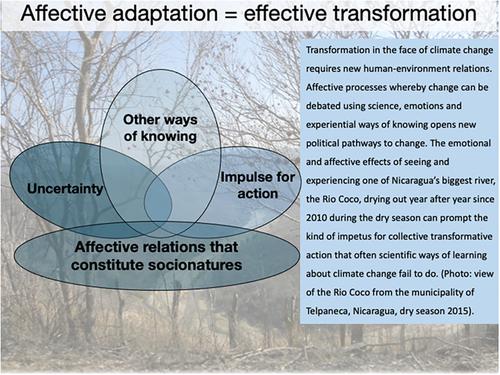当前位置:
X-MOL 学术
›
WIREs Clim. Chang.
›
论文详情
Our official English website, www.x-mol.net, welcomes your feedback! (Note: you will need to create a separate account there.)
Affective adaptation = effective transformation? Shifting the politics of climate change adaptation and transformation from the status quo
WIREs Climate Change ( IF 9.2 ) Pub Date : 2021-10-18 , DOI: 10.1002/wcc.740 Andrea J. Nightingale 1, 2 , Noémi Gonda 2 , Siri H. Eriksen 3
WIREs Climate Change ( IF 9.2 ) Pub Date : 2021-10-18 , DOI: 10.1002/wcc.740 Andrea J. Nightingale 1, 2 , Noémi Gonda 2 , Siri H. Eriksen 3
Affiliation

|
Alarming rates of environmental change have catalyzed scholars to call for fundamental transformations in social-political and economic relations. Yet cautionary tales about how power and politics are constitutive of these efforts fill the literature. We show how a relational framing of adaptation and transformation demands a political, cross-scalar, and socionatural analysis to probe the affects and effects of climate change and better grasp how transformative change unfolds. We bring affect theory into conversation with the literature on adaptation politics, socio-environmental transformations, subjectivity, and our empirical work to frame our analysis around three under investigated aspects of transformation: (i) the uncertain and unpredictable relations that constitute socionatures; (ii) other ways of knowing; and (iii) the affective and emotional relations that form a basis for action. Affective adaptation represents a different ontological take on transformation by reframing the socionatural, normative and ethical aspects as relational, uncertain, and performative. This directs analytical attention to processes rather than outcomes. The emphasis on the encounter between bodies in affect theory points to the need for experiential and embodied ways of knowing climate to effect transformative change. Effective transformation requires recognizing uncertainty and unpredictability as part of transformative processes. This is not because all outcomes are acceptable, but rather because uncertainty and unpredictability are elements which help generate affects (action) and emotional commitment to shared human and more than human relations in action, projects, and policies.
中文翻译:

情感适应=有效转化?从现状转变气候变化适应和转型的政治
环境变化的惊人速度促使学者呼吁对社会政治和经济关系进行根本性转变。然而,关于权力和政治如何构成这些努力的警示故事充满了文学作品。我们展示了适应和转型的关系框架如何需要政治、跨尺度和社会自然分析来探索气候变化的影响和影响,并更好地掌握转型变化如何展开。我们将影响理论与关于适应政治、社会环境转型、主观性的文献以及我们的实证工作进行对话,以围绕转型的三个研究方面进行分析:(i)构成社会性质的不确定和不可预测的关系;(ii) 其他认识方式;(iii) 构成行动基础的情感和情感关系。情感适应通过将社会自然、规范和伦理方面重新定义为关系性、不确定性和表演性,代表了一种不同的本体论转变。这将分析注意力引向过程而不是结果。在情感理论中强调身体之间的相遇表明需要通过经验和具体的方式来了解气候以实现变革性变化。有效的转型需要认识到不确定性和不可预测性 这将分析注意力引向过程而不是结果。在情感理论中强调身体之间的相遇表明需要通过经验和具体的方式来了解气候以实现变革性变化。有效的转型需要认识到不确定性和不可预测性 这将分析注意力引向过程而不是结果。在情感理论中强调身体之间的相遇表明需要通过经验和具体的方式来了解气候以实现变革性变化。有效的转型需要认识到不确定性和不可预测性转型过程的一部分。这并不是因为所有结果都是可以接受的,而是因为不确定性和不可预测性是有助于产生影响(行动)和情感承诺的因素,而不仅仅是行动、项目和政策中的人际关系。
更新日期:2021-10-18
中文翻译:

情感适应=有效转化?从现状转变气候变化适应和转型的政治
环境变化的惊人速度促使学者呼吁对社会政治和经济关系进行根本性转变。然而,关于权力和政治如何构成这些努力的警示故事充满了文学作品。我们展示了适应和转型的关系框架如何需要政治、跨尺度和社会自然分析来探索气候变化的影响和影响,并更好地掌握转型变化如何展开。我们将影响理论与关于适应政治、社会环境转型、主观性的文献以及我们的实证工作进行对话,以围绕转型的三个研究方面进行分析:(i)构成社会性质的不确定和不可预测的关系;(ii) 其他认识方式;(iii) 构成行动基础的情感和情感关系。情感适应通过将社会自然、规范和伦理方面重新定义为关系性、不确定性和表演性,代表了一种不同的本体论转变。这将分析注意力引向过程而不是结果。在情感理论中强调身体之间的相遇表明需要通过经验和具体的方式来了解气候以实现变革性变化。有效的转型需要认识到不确定性和不可预测性 这将分析注意力引向过程而不是结果。在情感理论中强调身体之间的相遇表明需要通过经验和具体的方式来了解气候以实现变革性变化。有效的转型需要认识到不确定性和不可预测性 这将分析注意力引向过程而不是结果。在情感理论中强调身体之间的相遇表明需要通过经验和具体的方式来了解气候以实现变革性变化。有效的转型需要认识到不确定性和不可预测性转型过程的一部分。这并不是因为所有结果都是可以接受的,而是因为不确定性和不可预测性是有助于产生影响(行动)和情感承诺的因素,而不仅仅是行动、项目和政策中的人际关系。


























 京公网安备 11010802027423号
京公网安备 11010802027423号